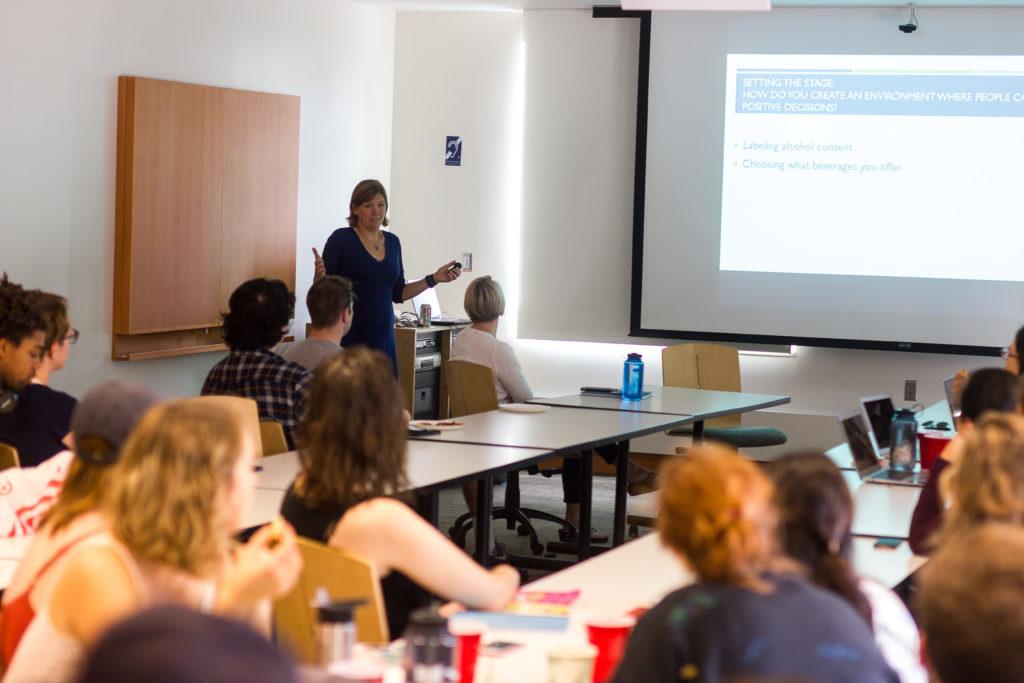
By Vera Kahn
kahnvera@grinnell.edu
This Saturday marks the second iteration of Fall Fest, the Department of Student Affairs’ response to 10/10, a student tradition up until last year. Due to a variety of factors, including excessive drinking and Title IX complaints, the dorm-lounge-based party was shut down. However, the school can’t stop off-campus parties from continuing the tradition. In order to make sure that this year’s off-campus festivities are as safe as possible, a harm reduction workshop and conversation was offered this week to students living off campus. Thirty-seven students, representing 13 different houses off-campus, were in attendance.
The workshop was largely organized by Artis Curiskis ’18 and Ella Williams ’18. Last year, Williams helped to coordinate an off-campus active bystander patrol team, and is currently looking to help organize self-defense classes aimed at women, gender nonconforming and non-binary people.
Curiskis said that, from his experience at parties during NSO, “off-campus housing need more concrete advice on how to provide a safe, welcoming and fun environment to host parties.” As a soccer player, Curiskis has gone through yearly, mandatory active bystander and substance abuse training that is not required for non-athletes.
The workshop was facilitated by Assistant Dean of Students and Director of Wellness and Prevention Jen Jacobsen and Assistant Director of Intercultural Affairs Jordan Brooks. Some of the questions they brought to the group included what students’ aims were in throwing parties, what they wished they could eliminate and how to facilitate those goals.
Active bystanderism was a major topic of the workshop. According to Jacobsen, 97 percent of Grinnellians believe that active bystanderism is integral to self-governance. However, when she asked the room what the steps of active bystanderism were, only one student, from the soccer team, was able to list them.
Although not explicitly addressed during the workshop, some discussion focused on the bias-motivated incidents from the past weeks in the Grinnell community: the use of the n-word by white students and the chanting of “USA” at the ISO Rave this past Saturday.
Brooks emphasized that active bystanderism “still applies” in instances of bias. He outlined some steps that hosts can take to address bias-motivated incidents. He proposed the idea that one option hosts have is to play cleaned-up versions of songs that contain the n-word. Another crucial step that hosts can take in diffusing bias-motivated conflict is to check in with people in a non-judgemental way. In the case of a conflict that appears to be escalating, he says the best thing to do is to separate the two parties involved.
The workshop serves as an indicator that the administration is interested in a dialogue about parties. Instead of simply shutting down 10/10 and condemning attempts to revive it, representatives from Student Affairs came together with off-campus students to discuss how to keep the community safe.
However, it is unclear how this commitment to student safety can be carried out when parties occur off-campus. When 10/10 was an on-campus affair, there was plenty of alcohol available, but there were also water bottles and mountains of pizza. Now that the party is off-campus, it is unclear if funding for food could come from the school. At the time of the workshop, there was no plan to fund food or water for the multi-house, day-long party.
For the last half of the meeting, Officer Bryce Doane of the Grinnell Police Department came to answer questions. Officer Doane is going to be working during the evening of 10/10 festivities. His presence was a part of an effort by SGA Vice President of Student Affairs Kahlil Epps to “improve [Grinnell Police Department] and campus body relationships.” Officer Doane explained that the current practice of the GPD is to shut down parties after a single noise complaint. He also emphasized that in the case of an officer coming to a party, it is not advised for everyone to run out of the house.
Officer Doane’s presence was a surprise to some, including Williams, who helped to organize the workshop, as the relationship between the Grinnell student body and the GPD is not based in trust. Officer Doane answered all questions posed to him, although he was stumped by the question of whether or not a person is allowed to urinate in their own backyard, asked by Henry Bolster ’18.
There are also questions regarding policing that were not voiced to Officer Doane. As Curiskis put it, “some people view that [police officers’] actions might be bias-related. As an active bystander in this community, how does my responsibility to step in … conflict with the law and order that these cops maintain?”
The Harm Reduction Workshop provided some answers on how to throw safer parties, and left some open. However, the impressive turnout and active participation by attendees bodes well for future dialogue surrounding safety at off-campus events.

















































